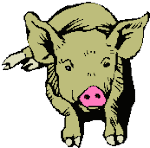.
British veterinary civil servants in the Health Protection Agency are finally admitting public risk from antibiotic resistance arising in pig farms.
“Recent research has found that those living up to 150m downwind of an intensive swine [pig] farming installation could be at risk of adverse human health effects associated with exposure to multi- drug resistant organisms.”
It does not seem much, but it is a massive about turn. It is hardly “recent research.”
The reality is that the risks to humans have been both known and realised for years, and denied by the veterinary establishment, who also claimed that Britain was free of porcine MRSA.
The Soil Association has already established and publicised the fact that Midland Pig Producers test pigs for MRSA, a problem that has never been admitted, and actually denied, in British pigs.
Now the fur will fly. They will all want to be first out the door with whatever they can take with them for a comfortable retirement.
It is now up to us to make sure there is a full public enquiry.
And, of course, that nothing like this ever happens again.
Full Soil Association Media Release
here
Health Protection Agency confirms human health concerns over proposed mega pig farm in Derbyshire
31 October 2011
In what may be a fatal blow to the Midland Pig Producers’ planning application, the Health Protection Agency have raised strong concerns about the potential risk to public health of the proposed ‘mega pig farm’ for South Derbyshire.
Following thousands of letters from the public, Derbyshire County Council asked the
Health Protection Agency (HPA) to submit evidence regarding the human health impacts of the proposed
Foston ‘mega’ Pig farm, an indoor pig factory for 2,500 mother pigs (sows) and around 20,000 piglets, with 1,000 pigs going for slaughter each week.
Expert advice given by the HPA confirms the detailed scientific review of evidence from around the world, submitted by the Soil Association last year.
The Soil Association objected to the proposal on the grounds that the extremely high number of pigs housed in one location may increase the level of disease on the holding and over time that may pose a threat to the health of the local community.
A statement by the HPA echoed these concerns and asserted that “recent research has found that those living up to 150m downwind of an intensive swine farming installation could be at risk of adverse human health effects associated with exposure to multi- drug resistant organisms.” ...
